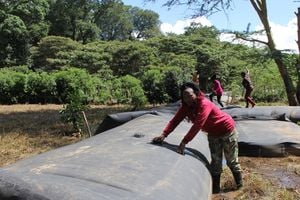Govt steps in to end Bomet, Kericho counties water wars

Water and Irrigation Principal Secretary Paul Ronoh.
The national government has stepped in to end the eight years long water conflict between Bomet and Kericho counties.
The two counties have been involved in a vicious tussle over bulk water supply from Itare water plant to the residents of Litein and Kapkatet trading centres in Bureti constituency of Kericho County, which has led to perennial cases of disconnections running for months.
Itare Water Supply Scheme, which produces 12,000 cubic metres of water daily, was established in 1986 by the ministry of water and irrigation to serve Bureti and Sotik in the former Kericho district.
Dr Paul Ronoh, the Principal Secretary (PS) for Water, Sanitation and Irrigation said the ministry was stepping in to end the dispute and ensure that residents of the region had access to clean and safe drinking water.
Bomet Water and Sanitation Company (Bomwasco) supplies bulk water to Kericho Water and Sanitation Company (Kewasco) from the Itare Water plant, which in turn sells it on retail to the 35,000 residents of Bureti constituency.
The agreement signed between the two water companies in April 2015, was approved on July, 3, 2015 by the Water Services Regulatory Board (Wasreb) as per available documents.
While the agreement binds Bomwasco to supply Kewasco 3,200 cubic metres daily, the latter is bound to promptly settle the bills due 21 days after being billed by the supplier.
But Kewasco has over the years been accused of failing to remit payments to Bomwasco for the supplies, despite billing the consumers on their end and receiving payments from them.
Latest reports indicate that Kericho County has an outstanding bill of over Sh20 million as a result of accrued delays in payments to Bomet County.
“We will rehabilitate the Itare water works and raise the water supply volumes from the current 12,000 to 18,000 million cubic metres,” Dr Ronoh said.
A water metre for Bomet and Kericho counties will then be installed at the treatment works site to authenticate consumption levels and payments due is remitted at the end of the month.
“The county that would not have paid for the water supplied through their respective companies will be disconnected. We must instill discipline in the way we manage our water, curb wastage, illegal connections and theft,” Dr Ronoh said.
The PS noted that in the past, the government had been casual in its approach to water management and that order has to prevail in the sector which is a key driving engine of economic and industrial growth.
Dr Ronoh was responding to pleas from leaders from Kericho county led by Governor Erick Mutai, Members of Parliament – Mr Benjamin Langat (Ainamoi), Mr Justice Kemei (Soin Sigowet), Mr Joseph Cherorot (Kipkelion East) and Woman Representative Ms Beatrice Kemei – to step in and find a lasting solution to the on and off standoff between the two counties.
The Itare Water scheme was initially operated by the Lake Victoria South Water Service Board through Tililbei Water and Sanitation Company (Tilwasco) – which was taken over by Kewasco following the onset of devolution and subsequent formation of county governments.
Bomwasco holds the position that the disconnections followed repeated breach of the legally binding bulk water supply contract with Kewasco.
Governor Mutai claimed that the disconnection was unnecessary, insensitive and in a bridge of the agreements signed between the parties.
“While Bomet should be supplying us with 3,200 cubic metres daily, we only get 2,000 cubic metres of the commodity, yet we also get perennially disconnected. We have been forced to buy pump sets and install them at the treatment plant, but we are still faced with disconnections,” said Dr Mutai.
Dr Mutai said that the national government should consider completely taking over management of the project so as to end the fight between the two counties over supply of the precious commodity.





